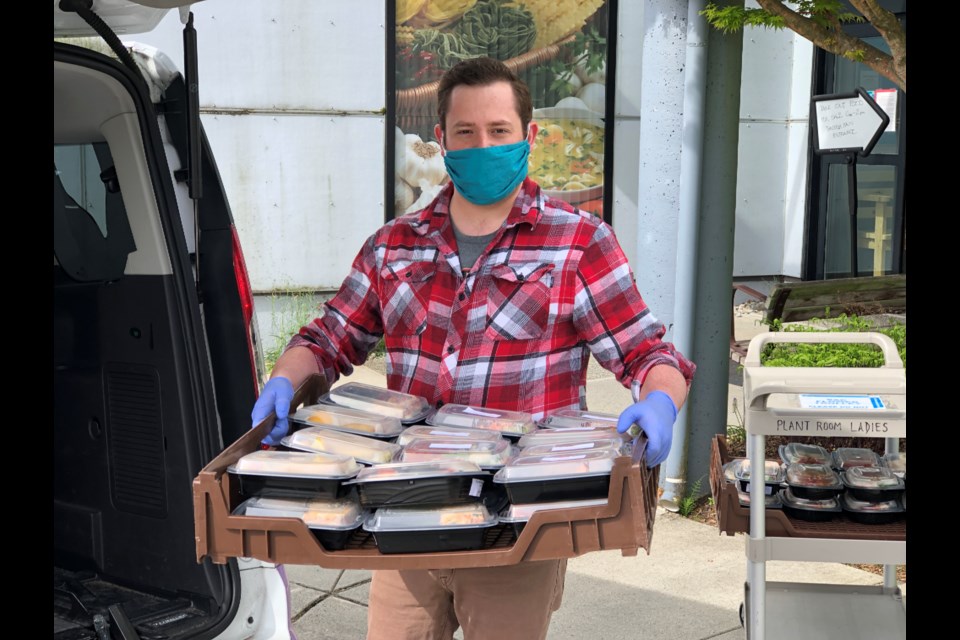A program that was created to help feed vulnerable seniors in West Vancouver in response to the COVID-19 pandemic has been recognized for its immense contribution to the community.
The District of West Vancouver’s Feed the Need program was this week presented with the BC Recreation and Parks Association Program Excellence Award. The award recognizes a creative, successful, and innovative program which may serve as a model for other recreation and parks agencies to enhance their services.
The volunteer-driven program that provides nutritious meals to hundreds of seniors, operates out of the community’s Seniors’ Activity Centre and it’s made a big impact since it began in March 2020.
“It has been an incredible journey,” Jill Lawlor, Acting Senior Manager of Community Services at the district, said.
“Serving the people that we are serving, it is pretty humbling to be able to have an impact, and to help these people at a time when it really means the world.”
When the pandemic struck, to identify each individual at-risk citizen in the community, volunteers conducted wellness assessments by placing phone calls to more than 6,700 seniors.
“I think sometimes we assume, here in West Vancouver, that we don't have some of the problems that we do,” Lawlor said.
“One of the most significant pieces that we've learned through this process was the fact that many of these people have been suffering from malnourishment and hunger for a very long period of time, well before COVID ever came along.
“But COVID gave us the ability to ask questions and to better understand what people were doing. When we had conversations with some of these seniors, and they would share, ‘Oh, I'm eating, I've got food.’ And we’d ask: ‘Well, what are you eating?’ And some would say, ‘Oh I had Kraft Dinner today, and I have some beans in the cupboard, and I buy my groceries at Dollarama.’
“Those were significant areas of concern for us.”
More than 26,000 free meals handed out
She said the program now delivers three meals a week to 366 vulnerable seniors living in low-income subsidized housing. At the end of 2020, the program had delivered more than 26,000 free meals.
When the Feed the Need program started serving seniors, who weren't eating enough protein and didn't have access to fresh or cooked vegetables, there were profound benefits.
“People were starting to report back that their health had improved, that they had more energy, that the concerns that they were managing with their diabetes, or their chronic illnesses, had diminished, and that they were feeling better,” Jill explained.
“We were getting reports back from our community health nurses that the people that we were serving, were having better health outcomes, and it was having a significant impact.”
While the benefits were clear, funding to keep the program going had been a little more difficult to pin down. However, last November, the community really stepped up to help keep Feed the Need going, raising $400,000, with $100,000 matched by the Ian and Rosemary Mottershead Fund. Lawlor added that support from the West Vancouver Foundation and West Vancouver Seniors Activity Centre Advisory Board had made a huge difference.
They now have enough funding to keep feeding vulnerable seniors through the majority of 2022, with each meal costing about $6.
Feed the Need has an 'incredible' team of volunteers
Lawlor said an “incredible” team of volunteers make the program a reality – from those doing food packaging to food delivery, to staff that are cooking, and others who check in with the seniors that are being supported.
“I would say that what we get back is more than we're able to give,” she said. “That the impact and the gratitude from the seniors that we’ve been able to serve has been very powerful. We're making that social connection – when we find out that it's someone's birthday, our staff bring by a cupcake along with their meal and a Happy Birthday wish – it’s having a really positive impact."
She also noted that support from local schools and businesses had allowed them to give a little extra to seniors, whether it’s a goodie bag with personal supplies or simply a kind message.
“It's giving people a connection back to our community,” she said. “Everyone has really come together and it's been beautiful to see these partnerships formed.”
Lawlor said the best part about being recognized with the BCRPA Program Excellence Award was the opportunity to share their stories with other communities, and potentially inspire similar programs.
“I don't think we are unique in this struggle,” she said. “I don't think our residents alone. And we're stepping outside of our regular traditional role in recreation and we're reaching out and doing community outreach work.
“It would be great if other communities across the province or across the country could learn from our experiences and find ways to duplicate the service.”
Elisia Seeber is the North Shore News’ Indigenous and civic affairs reporter. This reporting beat is made possible by the Local Journalism Initiative.



